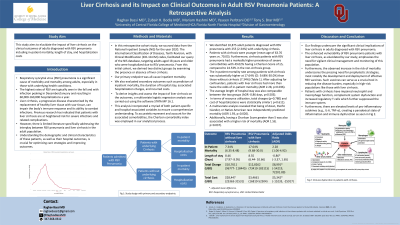Monday Poster Session
Category: Liver
P2947 - Liver Cirrhosis and its Impact on Clinical Outcomes in Adult Respiratory Syncytial Virus Pneumonia: A Retrospective Analysis of the National Inpatient Sample
Monday, October 28, 2024
10:30 AM - 4:00 PM ET
Location: Exhibit Hall E

Has Audio

Raghav Bassi, MD
University of Central Florida College of Medicine
Gainesville, FL
Presenting Author(s)
Raghav Bassi, MD1, Zubair H.. Bodla, MD1, Mariam Hashmi, MD2, Fatima Niaz, MD3, Muhammad J. Khalil, MD4, Yaseen Perbtani, DO1, Tony S.. Brar, MD1
1University of Central Florida College of Medicine, Gainesville, FL; 2University of Central Florida College of Medicine, Chicago, FL; 3King Edward Medical University, Lahore, Punjab, Pakistan; 4University of Alabama, Montgomery, AL
Introduction: Respiratory syncytial virus (RSV) pneumonia is a significant cause of mortality, especially among adults with underlying comorbidities. Liver cirrhosis can impair the body's immune response and its ability to fight infections, increasing rates of severe infections. However, there is limited literature addressing the interplay between RSV pneumonia and liver cirrhosis in the adult population. The aim of this study is to elucidate the impact of liver cirrhosis on clinical outcomes in adults diagnosed with RSV pneumonia.
Methods: Retrospective analysis using the 2020 national inpatient sample dataset, and utilizing relevant ICD-10-CM codes to identify adults aged 18 years and older who were hospitalized with RSV pneumonia. From this cohort, we derived two distinct groups by examining the presence or absence of liver cirrhosis.
Results: We identified 10,875 adult patients diagnosed with RSV pneumonia with 255 (2.34%) with underlying cirrhosis. Furthermore, cirrhosis patients with RSV pneumonia had a markedly higher prevalence of severe comorbidities with 49.02% having a Charlson Score of ≥5, compared to 24.53% in the non-cirrhosis group. The in-patient mortality rate among patients with cirrhosis was substantially higher at 17.64% (CI: 9.68%-30.0%) than those without cirrhosis (7.34%) (Table 1). After adjusting for confounders, patients with liver cirrhosis had more than twice the odds of in-patient mortality (AOR 2.28, p=0.036). A multivariate analysis revealed that being of Asian, Pacific Islander, or Native American race independently predicted mortality (AOR 1.93, p=0.020). Additionally, having a Charlson Score greater than 5 was also associated with a higher risk of mortality (AOR 1.58, p=0.037).
Discussion: Systemic inflammation and immunodeficiency are important components of immune dysfunction in patients with cirrhosis. Our study highlights the clinical implications of liver cirrhosis in adults diagnosed with RSV pneumonia. It also emphasizes the need for vigilant clinical management and monitoring given the increased risk of mortality. It underscores the pressing need for prophylactic strategies, most notably RSV vaccination which can serve as a crucial tool in reducing the disease burden, especially in high-risk populations like those with cirrhosis.
Note: The table for this abstract can be viewed in the ePoster Gallery section of the ACG 2024 ePoster Site or in The American Journal of Gastroenterology's abstract supplement issue, both of which will be available starting October 27, 2024.
Disclosures:
Raghav Bassi, MD1, Zubair H.. Bodla, MD1, Mariam Hashmi, MD2, Fatima Niaz, MD3, Muhammad J. Khalil, MD4, Yaseen Perbtani, DO1, Tony S.. Brar, MD1. P2947 - Liver Cirrhosis and its Impact on Clinical Outcomes in Adult Respiratory Syncytial Virus Pneumonia: A Retrospective Analysis of the National Inpatient Sample, ACG 2024 Annual Scientific Meeting Abstracts. Philadelphia, PA: American College of Gastroenterology.
1University of Central Florida College of Medicine, Gainesville, FL; 2University of Central Florida College of Medicine, Chicago, FL; 3King Edward Medical University, Lahore, Punjab, Pakistan; 4University of Alabama, Montgomery, AL
Introduction: Respiratory syncytial virus (RSV) pneumonia is a significant cause of mortality, especially among adults with underlying comorbidities. Liver cirrhosis can impair the body's immune response and its ability to fight infections, increasing rates of severe infections. However, there is limited literature addressing the interplay between RSV pneumonia and liver cirrhosis in the adult population. The aim of this study is to elucidate the impact of liver cirrhosis on clinical outcomes in adults diagnosed with RSV pneumonia.
Methods: Retrospective analysis using the 2020 national inpatient sample dataset, and utilizing relevant ICD-10-CM codes to identify adults aged 18 years and older who were hospitalized with RSV pneumonia. From this cohort, we derived two distinct groups by examining the presence or absence of liver cirrhosis.
Results: We identified 10,875 adult patients diagnosed with RSV pneumonia with 255 (2.34%) with underlying cirrhosis. Furthermore, cirrhosis patients with RSV pneumonia had a markedly higher prevalence of severe comorbidities with 49.02% having a Charlson Score of ≥5, compared to 24.53% in the non-cirrhosis group. The in-patient mortality rate among patients with cirrhosis was substantially higher at 17.64% (CI: 9.68%-30.0%) than those without cirrhosis (7.34%) (Table 1). After adjusting for confounders, patients with liver cirrhosis had more than twice the odds of in-patient mortality (AOR 2.28, p=0.036). A multivariate analysis revealed that being of Asian, Pacific Islander, or Native American race independently predicted mortality (AOR 1.93, p=0.020). Additionally, having a Charlson Score greater than 5 was also associated with a higher risk of mortality (AOR 1.58, p=0.037).
Discussion: Systemic inflammation and immunodeficiency are important components of immune dysfunction in patients with cirrhosis. Our study highlights the clinical implications of liver cirrhosis in adults diagnosed with RSV pneumonia. It also emphasizes the need for vigilant clinical management and monitoring given the increased risk of mortality. It underscores the pressing need for prophylactic strategies, most notably RSV vaccination which can serve as a crucial tool in reducing the disease burden, especially in high-risk populations like those with cirrhosis.
Note: The table for this abstract can be viewed in the ePoster Gallery section of the ACG 2024 ePoster Site or in The American Journal of Gastroenterology's abstract supplement issue, both of which will be available starting October 27, 2024.
Disclosures:
Raghav Bassi indicated no relevant financial relationships.
Zubair Bodla indicated no relevant financial relationships.
Mariam Hashmi indicated no relevant financial relationships.
Fatima Niaz indicated no relevant financial relationships.
Muhammad Khalil indicated no relevant financial relationships.
Yaseen Perbtani indicated no relevant financial relationships.
Tony Brar indicated no relevant financial relationships.
Raghav Bassi, MD1, Zubair H.. Bodla, MD1, Mariam Hashmi, MD2, Fatima Niaz, MD3, Muhammad J. Khalil, MD4, Yaseen Perbtani, DO1, Tony S.. Brar, MD1. P2947 - Liver Cirrhosis and its Impact on Clinical Outcomes in Adult Respiratory Syncytial Virus Pneumonia: A Retrospective Analysis of the National Inpatient Sample, ACG 2024 Annual Scientific Meeting Abstracts. Philadelphia, PA: American College of Gastroenterology.

